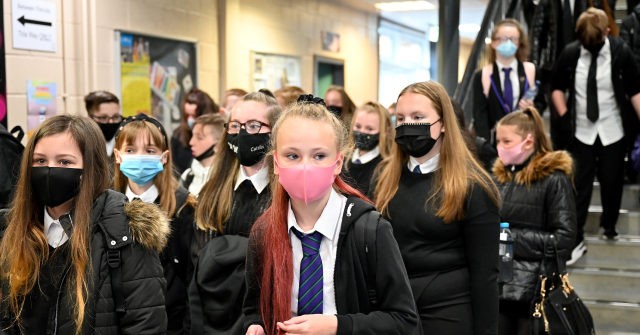Mental health specialists have described the phenomena of “locked-in trauma” plaguing youngsters after more than a year of lockdowns, with children as young as five experiencing anxiety, including about playing with others.
The experts also believe that some 1.5 million children and young people will need treatment for mental health problems after the waves of lockdowns and social distancing, with waiting lists on the NHS so long — up to four years in some parts of the country — that many parents are opting to pay privately for care.
An investigation by The Telegraph published on Monday found specialists revealed that children had become frightened of everyday social interactions, fueled by social distancing and the fear of infection.
Children’s Commissioner for England Dame Rachel De Souza described it as “locked-in trauma”, with youngsters experiencing difficulties readjusting to normal life, including “not knowing how to make friends anymore” and “not knowing how to talk to anyone else”.
Senior figures at an NHS Federation meeting admitted that their own children had experienced such behaviours as a fear of going outside. One described her five-year-old as “housebound”. Another said their daughter had a panic attack after a play-date with friends.
The newspaper reported that in the 12 months since the beginning of the first lockdown (March 2020), the National Health Service has treated more than 420,000 young people and children for mental health issues, rising 11 per cent in two years.
Child psychologist Maryhan Baker said that the problem will worsen before it gets better, remarking that children who may have been a little anxious about lockdown were now exhibiting “control behaviours”, such as self-harm and eating disorders.
We haven't got out of this lockdown yet and they're already talking up the next one https://t.co/y8wGbY0Bf5
— Breitbart London (@BreitbartLondon) June 21, 2021
Doctors and mental health professionals have warned in the last several months of the effect of lockdown on children, and the rising number of those exhibiting mental health problems.
In February, a Bradford doctor revealed his accident and emergency ward had seen an increase in the number of children who had self-harmed or overdosed on drugs, with the patients getting younger and younger.
“Children in mental health crisis used to be brought to A&E about twice a week. Since the summer it’s been more like once or twice a day. Some as young as 10 have cut themselves, taken overdoses, or tried to asphyxiate themselves,” Dr John Wright wrote, adding: “There was even one child aged eight.”
The following week, a London psychologist said that without a doubt, the lockdown had caused the surge in mental health support referrals for children, and had likewise seen a rise in minors overdosing or cutting themselves at A&E.
“The closure of schools, the lack of contact with friends and stopping all sports activities is having a particularly damaging effect on children,” Mr Omer Moghraby said.
That same month a BBC investigation found that the number of children between the ages of nine and 12 self-harming had doubled in six years, with specialists observing that mental health issues were “increasing in this very young age range”.
Lockdown sceptic and former UK Supreme Court judge Lord Jonathan Sumption warned of the “cost” of all these lockdowns, “not just the cost in economic terms, but in human terms”, calling the effect restrictions were having on the ability of the vulnerable to live fulfilling lives as “inhuman”.
“The policy of lockdown is a thoroughly inhumane policy which is due to one-track minds that can only think about deaths and not about life,” Lord Sumption had said.
Oi! Where's your being outside licence? https://t.co/h6pSdadvVM
— Breitbart London (@BreitbartLondon) June 21, 2021





